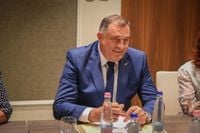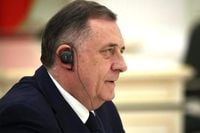On May 8, 2025, Milorad Dodik, the President of Republika Srpska, arrived in Moscow to participate in the events commemorating the 80th anniversary of Victory Day. This significant celebration marks the defeat of fascism in World War II, a historical moment that resonates deeply within the region and beyond.
Dodik's delegation includes notable figures such as the Chairman of the People's Skupstina of Republika Srpska, Nenad Stevandic, and the Serbian member of the Presidency of Bosnia and Herzegovina, Zeljka Cvijanovic, who is arriving from New York. Dodik expressed pride in representing Republika Srpska at this momentous occasion, stating, "We will represent Republika Srpska with dignity. There will be the Chairman of the People's Skupstina of Republika Srpska Nenad Stevandic and the Serbian member of the Presidency of Bosnia and Herzegovina Zeljka Cvijanovic, who will arrive from New York."
The visit to Moscow is not merely a ceremonial affair; it serves as a platform for Dodik and his delegation to engage with leaders from around the world. Upon his arrival, Dodik remarked, "I am here to commemorate Victory Day over fascism; this is an important event, and I am glad to attend such an occasion." His statement underscores the significance of the day, which symbolizes resilience and unity against oppression.
This year's Victory Day celebrations have attracted a diverse array of international leaders, enhancing the event's prominence. Notable attendees include the President of Ethiopia, Taiye Atske-Selassie, and the President of South Ossetia, Alan Gagloev, both of whom also arrived in Moscow on the same day as Dodik. The previous day saw the arrival of several other heads of state, including Serbian President Aleksandar Vucic, Mongolian President Ukhnaagiin Khurelsukh, Chinese President Xi Jinping, and Brazilian President Luis Inacio Lula da Silva. Their presence highlights the global recognition of the importance of this historical event.
Dodik's participation in the Victory Day celebrations is particularly significant given the geopolitical context of the region. Republika Srpska, being a part of Bosnia and Herzegovina, has often found itself at the crossroads of regional and international politics. The representation of Dodik and his delegation at such a high-profile event showcases the ongoing relevance of historical narratives in contemporary political discourse.
The invitation extended to Dodik by Russian President Vladimir Putin further emphasizes the strengthening ties between Republika Srpska and Russia. These ties have been a topic of discussion among political analysts, who note that the relationship may influence broader regional dynamics. As Dodik stated, this visit provides an opportunity for meetings with key figures in the Russian capital, potentially paving the way for future collaborations.
Moreover, the celebration of Victory Day serves as a reminder of the sacrifices made during the war and the importance of remembering history to prevent the recurrence of such conflicts. As Dodik and other leaders gather to honor this pivotal moment in history, they also reflect on the lessons learned and the importance of unity in the face of adversity.
In recent years, the narrative surrounding World War II and its aftermath has been a subject of intense debate in various countries, including those in the Balkans. The differing perspectives on historical events often lead to discussions about national identity and collective memory. Dodik's comments during the celebrations may resonate with those who view the victory over fascism as a cornerstone of their national pride.
As the celebrations unfold, it remains to be seen how Dodik's presence and the discussions held during this time will influence the political landscape in Bosnia and Herzegovina and its relations with neighboring countries. Observers will be keenly watching for any statements or agreements that may emerge from these high-level meetings.
In conclusion, Milorad Dodik's arrival in Moscow for the Victory Day celebrations not only highlights the significance of this historical event but also underscores the ongoing political narratives that shape the region. With a delegation that includes key figures from Republika Srpska, the event serves as a platform for dialogue and reflection on the past, while also looking towards the future.



